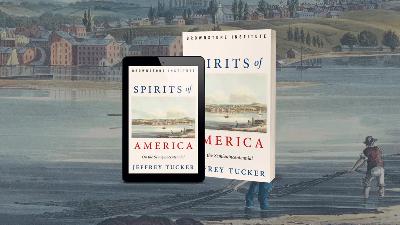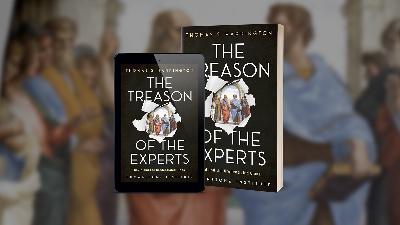Bootleggers and Bureaucrats Agree on Global Health
Update: 2025-10-09
Description
By Roger Bate at Brownstone dot org.
Introduction
Global public health has long been animated by moral purpose and collective ambition. When nations join under the banner of "health for all," it reflects both humanitarian conviction and political calculation. Yet, the architecture of global health governance often produces outcomes that diverge from its lofty ideals. The World Health Organization (WHO), its treaties, and its many partnerships embody both the promise and the peril of global cooperation: institutions that begin as vehicles for public good can evolve into complex bureaucracies driven by competing incentives.
A useful way to understand this paradox is through the old "Bootleggers and Baptists" framework - coined to explain how moral crusaders ("Baptists") and opportunists ("Bootleggers") find common cause in supporting regulation.
In global health, this coalition reappears in modern form: moral entrepreneurs who campaign for universal virtue and institutional purity, joined by actors who benefit materially or reputationally from the resulting rules. But there is a third, often overlooked participant - the bureaucrat. Bureaucrats, whether within WHO secretariats or international treaty bodies, become the custodians of regulation and its moral aura. Over time, their incentives can subtly shift from serving the public interest to preserving and enlarging their institutional mandate.
This essay explores how these three forces - the Baptists, the Bootleggers, and the Bureaucrats - interact within global health governance. It looks at the WHO's Framework Convention on Tobacco Control (FCTC) as a revealing case, and then considers how similar patterns are emerging in the proposed Pandemic Treaty. The analysis argues that moral certainty, donor dependency, and bureaucratic self-preservation often combine to produce rigid, exclusionary, and sometimes counterproductive global health regimes. The challenge is not to reject global cooperation, but to design it in ways that resist these incentives and remain responsive to evidence and accountability.
Bootleggers and Baptists in Global Health
The "Bootleggers and Baptists" dynamic was first described in the context of US alcohol prohibition: moral reformers (Baptists) called for bans on Sunday liquor sales to protect public virtue, while illegal distillers (Bootleggers) quietly supported the same restrictions because they reduced competition. Together, they sustained a regulation that each group wanted for different reasons.
In global health, the same coalition appears frequently. The "Baptists" are the moral crusaders - public health activists, foundations, and advocacy NGOs that promote regulations framed in universal ethical language: eliminating tobacco, ending obesity, halting pandemics. Their arguments often appeal to collective responsibility and moral urgency. They mobilize attention, generate legitimacy, and supply the moral energy that international institutions depend upon.
The "Bootleggers" are the economic and bureaucratic actors who benefit materially or strategically from these same campaigns. They include pharmaceutical firms that profit from mandated interventions, governments that gain moral prestige through leadership in treaty negotiations, and donor organizations that extend their influence through targeted funding. The alignment between moral appeal and material interest gives regulatory projects their durability - and their opacity.
Unlike national policy debates, global health regulation takes place far from direct democratic oversight. It is negotiated by diplomats and sustained by international bureaucracies that answer only indirectly to voters. This distance allows the Bootlegger-Baptist coalition to operate with less friction. The Baptists supply moral legitimacy; the Bootleggers provide resources and political cover. The resulting regulations are difficult to challenge, even when evidence shifts or unintended consequences emerge.
Bureaucrats and...
Introduction
Global public health has long been animated by moral purpose and collective ambition. When nations join under the banner of "health for all," it reflects both humanitarian conviction and political calculation. Yet, the architecture of global health governance often produces outcomes that diverge from its lofty ideals. The World Health Organization (WHO), its treaties, and its many partnerships embody both the promise and the peril of global cooperation: institutions that begin as vehicles for public good can evolve into complex bureaucracies driven by competing incentives.
A useful way to understand this paradox is through the old "Bootleggers and Baptists" framework - coined to explain how moral crusaders ("Baptists") and opportunists ("Bootleggers") find common cause in supporting regulation.
In global health, this coalition reappears in modern form: moral entrepreneurs who campaign for universal virtue and institutional purity, joined by actors who benefit materially or reputationally from the resulting rules. But there is a third, often overlooked participant - the bureaucrat. Bureaucrats, whether within WHO secretariats or international treaty bodies, become the custodians of regulation and its moral aura. Over time, their incentives can subtly shift from serving the public interest to preserving and enlarging their institutional mandate.
This essay explores how these three forces - the Baptists, the Bootleggers, and the Bureaucrats - interact within global health governance. It looks at the WHO's Framework Convention on Tobacco Control (FCTC) as a revealing case, and then considers how similar patterns are emerging in the proposed Pandemic Treaty. The analysis argues that moral certainty, donor dependency, and bureaucratic self-preservation often combine to produce rigid, exclusionary, and sometimes counterproductive global health regimes. The challenge is not to reject global cooperation, but to design it in ways that resist these incentives and remain responsive to evidence and accountability.
Bootleggers and Baptists in Global Health
The "Bootleggers and Baptists" dynamic was first described in the context of US alcohol prohibition: moral reformers (Baptists) called for bans on Sunday liquor sales to protect public virtue, while illegal distillers (Bootleggers) quietly supported the same restrictions because they reduced competition. Together, they sustained a regulation that each group wanted for different reasons.
In global health, the same coalition appears frequently. The "Baptists" are the moral crusaders - public health activists, foundations, and advocacy NGOs that promote regulations framed in universal ethical language: eliminating tobacco, ending obesity, halting pandemics. Their arguments often appeal to collective responsibility and moral urgency. They mobilize attention, generate legitimacy, and supply the moral energy that international institutions depend upon.
The "Bootleggers" are the economic and bureaucratic actors who benefit materially or strategically from these same campaigns. They include pharmaceutical firms that profit from mandated interventions, governments that gain moral prestige through leadership in treaty negotiations, and donor organizations that extend their influence through targeted funding. The alignment between moral appeal and material interest gives regulatory projects their durability - and their opacity.
Unlike national policy debates, global health regulation takes place far from direct democratic oversight. It is negotiated by diplomats and sustained by international bureaucracies that answer only indirectly to voters. This distance allows the Bootlegger-Baptist coalition to operate with less friction. The Baptists supply moral legitimacy; the Bootleggers provide resources and political cover. The resulting regulations are difficult to challenge, even when evidence shifts or unintended consequences emerge.
Bureaucrats and...
Comments
In Channel
























